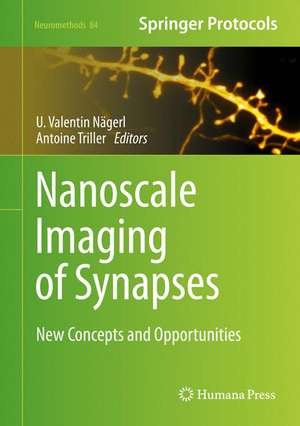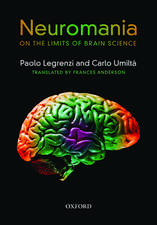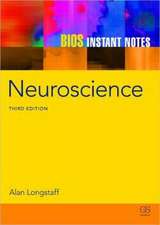Nanoscale Imaging of Synapses: New Concepts and Opportunities: Neuromethods, cartea 84
Editat de U. Valentin Nägerl, Antoine Trilleren Limba Engleză Hardback – 5 feb 2014
| Toate formatele și edițiile | Preț | Express |
|---|---|---|
| Paperback (1) | 944.99 lei 43-57 zile | |
| Springer – 23 aug 2016 | 944.99 lei 43-57 zile | |
| Hardback (1) | 952.26 lei 43-57 zile | |
| Springer – 5 feb 2014 | 952.26 lei 43-57 zile |
Din seria Neuromethods
- 5%
 Preț: 347.57 lei
Preț: 347.57 lei - 15%
 Preț: 659.53 lei
Preț: 659.53 lei - 15%
 Preț: 665.08 lei
Preț: 665.08 lei - 18%
 Preț: 986.63 lei
Preț: 986.63 lei - 24%
 Preț: 852.89 lei
Preț: 852.89 lei - 18%
 Preț: 953.03 lei
Preț: 953.03 lei - 18%
 Preț: 955.25 lei
Preț: 955.25 lei - 20%
 Preț: 1129.36 lei
Preț: 1129.36 lei - 20%
 Preț: 1252.04 lei
Preț: 1252.04 lei - 18%
 Preț: 1291.45 lei
Preț: 1291.45 lei - 15%
 Preț: 652.31 lei
Preț: 652.31 lei - 18%
 Preț: 955.70 lei
Preț: 955.70 lei - 23%
 Preț: 705.39 lei
Preț: 705.39 lei - 18%
 Preț: 973.38 lei
Preț: 973.38 lei - 18%
 Preț: 964.86 lei
Preț: 964.86 lei - 18%
 Preț: 968.03 lei
Preț: 968.03 lei - 15%
 Preț: 662.95 lei
Preț: 662.95 lei - 15%
 Preț: 646.43 lei
Preț: 646.43 lei - 15%
 Preț: 649.71 lei
Preț: 649.71 lei -
 Preț: 395.29 lei
Preț: 395.29 lei - 19%
 Preț: 580.67 lei
Preț: 580.67 lei - 19%
 Preț: 584.12 lei
Preț: 584.12 lei - 19%
 Preț: 566.41 lei
Preț: 566.41 lei - 15%
 Preț: 652.17 lei
Preț: 652.17 lei - 15%
 Preț: 655.13 lei
Preț: 655.13 lei - 18%
 Preț: 959.36 lei
Preț: 959.36 lei - 15%
 Preț: 652.49 lei
Preț: 652.49 lei - 15%
 Preț: 649.54 lei
Preț: 649.54 lei - 15%
 Preț: 649.87 lei
Preț: 649.87 lei - 15%
 Preț: 650.19 lei
Preț: 650.19 lei - 15%
 Preț: 648.42 lei
Preț: 648.42 lei - 18%
 Preț: 1039.22 lei
Preț: 1039.22 lei - 18%
 Preț: 963.15 lei
Preț: 963.15 lei
Preț: 952.26 lei
Preț vechi: 1161.29 lei
-18% Nou
Puncte Express: 1428
Preț estimativ în valută:
182.23€ • 189.10$ • 152.32£
182.23€ • 189.10$ • 152.32£
Carte tipărită la comandă
Livrare economică 17-31 martie
Preluare comenzi: 021 569.72.76
Specificații
ISBN-13: 9781461491781
ISBN-10: 1461491789
Pagini: 250
Ilustrații: X, 231 p. 57 illus., 49 illus. in color.
Dimensiuni: 178 x 254 x 17 mm
Greutate: 0.64 kg
Ediția:2014
Editura: Springer
Colecția Humana
Seria Neuromethods
Locul publicării:New York, NY, United States
ISBN-10: 1461491789
Pagini: 250
Ilustrații: X, 231 p. 57 illus., 49 illus. in color.
Dimensiuni: 178 x 254 x 17 mm
Greutate: 0.64 kg
Ediția:2014
Editura: Springer
Colecția Humana
Seria Neuromethods
Locul publicării:New York, NY, United States
Public țintă
ResearchCuprins
Preface.- Nanoscale imaging of protein molecules at the postsynaptic densit.- Electron tomography for the study of synaptic ultrastructure in fixed brain sections.- Time-resolved electron microscopy: coupling optogenetics with high-pressure freezing.- Investigating AMPA receptors diffusion and nanoscale organization at synapses with high density single molecule tracking methods.- Visualising the ultra-structures and dynamics of synapses by single molecule nanoscopy.- Live-cell PALM of intracellular proteins in neurons.- Monitoring nanoscale mobility of small molecules with time-resolved fluorescence anisotropy imaging.- Imaging signalling transduction in single dendritic spines.- Imaging-based measures of synaptic tenacity.- Zooming in on the (peri)synaptic extracellular matrix.- Two-photon STED microscopy for imaging synapses and glia in acute brain slices.- Index.
Textul de pe ultima copertă
Synapses underlie rapid and flexible neural communication in the brain and they hold the key to understanding higher brain functions in health and disease. Because they are very small and highly dynamic, it is very difficult to study them with traditional techniques. Fortunately, recent ground-breaking advances in microscopy have greatly improved our ability to image synapses at the nanoscale, even down to the level of single molecules.
Authored by leading practitioners and developers in the field, this volume focuses on the nanoscale analysis of the molecular and structural organization and dynamics of synapses of the central nervous system, utilizing superresolution (e.g. PALM, STORM, STED) and other advanced methods (e.g. EM tomography, optogenetics, FLIM). It explains the basic principles behind the various nanoscale imaging modalities, how they are implemented and what their scope and limitations are, while also highlighting several exciting new research opportunities for synapse research enabled by them.
Authored by leading practitioners and developers in the field, this volume focuses on the nanoscale analysis of the molecular and structural organization and dynamics of synapses of the central nervous system, utilizing superresolution (e.g. PALM, STORM, STED) and other advanced methods (e.g. EM tomography, optogenetics, FLIM). It explains the basic principles behind the various nanoscale imaging modalities, how they are implemented and what their scope and limitations are, while also highlighting several exciting new research opportunities for synapse research enabled by them.
Caracteristici
Timeliness – Superresolution methods are beginning to transform neurobiological research Relevance – Progress in synapse research hinges on advances in superresolution imaging Competence – Chapters are written by leading innovators and practitioners in the field of bioimaging Includes supplementary material: sn.pub/extras
















